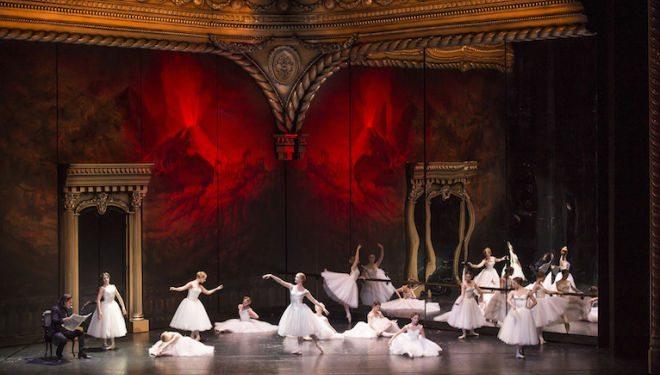
The court looks sumptuous enough with its tumbling silks and satins in Old Master colours and glam-rock hair-dos (design by Michael Vale, costumes by Tanya McCallin, lighting by Paule Constable), but it's a moral vacuum. The hangers-on disappear into a cave-like hole, like vermin.
In contrast, the West Side Story chicken wire shack that is home to innocent Gilda, who has the misfortune to fall for the Duke of Mantua (at church, of all places), is a place of purity, until the libertine bribes his way in. The link between the two homes is the Duke's deformed court jester who gives the opera its title, and who is Gilda's protective father.
But in this deceptively complex opera, the father who is stricken when his daughter is abducted is no saint: he colluded earlier over the ill-treatment of another man's daughter. And he will pay an assassin to take the life the Duke. The emotional layering of the Greek baritone Dimitri Platanias as Rigoletto is not entirely convincing, but the singing is mighty from inside his cockroach carapace.
(The Russian Dmitri Hvorostovsky, who died last month was initially cast for some performances as Rigoletto; performances are dedicated to his memory, Royal Opera House director of opera Oliver Mears told the Covent Garden first night audience, which adored him.)
The American star tenor Michael Fabiano, returning, to the Royal Opera House after his triumphant Rodolfo in Puccini’s La Bohème, which opened the Covent Garden 2017/18 season, sings the Duke, with the massive and open tenor sound that only rarely makes you want for a slightly more Italianate warmth.
As Gilda, Russian soprano Sofia Fomina is a sweet-voiced caged songbird, who proves to be a fighter when the life of the man she loves is at stake. Here is one of the finest demonstrations that love is blind: she listens in to the Duke's advances on sultry Maddalena, and still does not doubt him. Her abduction, though, is slightly botched – not wanting for voice,why does she not scream the house down? Perhaps wardrobe could look out a gag.
Bulgarian mezzo-soprano Nadia Krasteva with the thrilling Italian bass Andrea Mastroni as her assassin brother Sparafucile inject into the uncluttered last act a passion somewhat wanting earlier. The whole production until this point has been slightly weighed down by spectacle; now the music breaks free. It does so too when James Rutherford's imposing vengeful father Monterone brings the court to a rare standstill.
Alexander Joel
conducts the Orchestra of the Royal Opera House whose high strings slit rapier-like through Verdi's score, and the splendid male chorus is only hampered by the number of other bodies on a stage stuffed with actors; I missed that concentrated Verdian surge. But like so many of those puzzling cocktails at this time of year, this Rigoletto is a heady, moreish mix of the luscious and the bitter. Cheers!
Rigoletto is sung in Italian with English surtitles. Some roles are recast in later performances. The opera is relayed live to cinemas on 16 January: click here for more details. It is also broadcast on BBC Radio 3 on 24 February.
| What | Verdi's Rigoletto review , Royal Opera House |
| Where | Royal Opera House, Bow Street, Covent Garden, London, WC2E 9DD | MAP |
| Nearest tube | Covent Garden (underground) |
| When |
14 Dec 17 – 16 Jan 18, nine performances, one at 12PM |
| Price | £6 - £185 |
| Website | http://www.roh.org.uk/productions/rigoletto-by-david-mcvicar |






